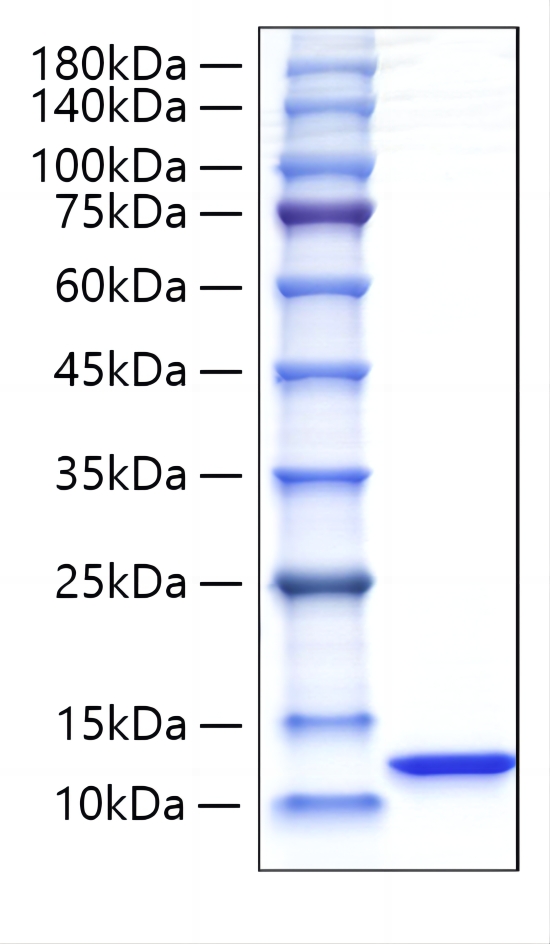Description
Recombinant Rat CXCL1/GRO-alpha Protein
The Recombinant Rat CXCL1/GRO-alpha Protein is a high-quality recombinant protein produced for advanced research applications in molecular biology and biotechnology. This protein serves as a critical reagent in various experimental contexts, including functional studies, binding assays, and therapeutic development programs, providing researchers with a standardized and reliable tool for investigating protein function and interactions.
This product (SKU: RPCB1282) is produced using HEK293 cells and features a C-Avi-His tag for convenient detection and purification. The protein exhibits a calculated molecular weight of 10.56 kDa with an observed molecular weight of 10-15 kDa under denaturing conditions, achieving ≥ 95% as determined by SDS-PAGE., ensuring exceptional quality and consistency for research applications.
Key Features
| High Purity by Affinity Chromatography | |
| Mammalian & Bacterial Expression Systems | |
| High lot-to-lot consistency via strict QC |
| Product Name: | Recombinant Rat CXCL1/GRO-alpha Protein |
| SKU: | RPCB1282 |
| Size: | 10 μg , 20 μg , 50 μg , 100 μg |
| Reactivity: | Rat |
| Synonyms: | Gro1, CINC-1, rRtGRO-α/CXCL1, Growth-regulated alpha protein, C-X-C motif chemokine 1, CINC-1 |
| Tag: | C-Avi-His |
| Expression Host: | HEK293 cells |
| Calculated MW: | 10.56 kDa |
| Observed MW: | 10-15 kDa |
| Gene ID: | 81503 |
| Protein Description: | High quality, high purity and low endotoxin recombinant Recombinant Rat CXCL1/GRO-alpha Protein (RPCB1282), tested reactivity in HEK293 cells and has been validated in SDS-PAGE.100% guaranteed. |
| Endotoxin: | < 0.1 EU/μg of the protein by LAL method. |
| Purity: | ≥ 95% as determined by SDS-PAGE. |
| Formulation: | Lyophilized from a 0.22 μm filtered solution of PBS, pH 7.4. |
| Reconstitution: | Centrifuge the vial before opening. Reconstitute to a concentration of 0.1-0.5 mg/mL in sterile distilled water. Avoid vortex or vigorously pipetting the protein. For long term storage, it is recommended to add a carrier protein or stablizer (e.g. 0.1% BSA, 5% HSA, 10% FBS or 5% Trehalose), and aliquot the reconstituted protein solution to minimize free-thaw cycles. |
| Storage: | Store at -20℃.Store the lyophilized protein at -20℃ to -80 ℃ up to 1 year from the date of receipt. After reconstitution, the protein solution is stable at -20℃ for 3 months, at 2-8℃ for up to 1 week. |
CXCL1, also known as KC, GRO alpha, and CINC-1, is an approximately 8 kDa proinflammatory chemokine that plays a key role in neutrophil migration and activation. Mature human CXCL1 shares 64% and 67% aa sequence identity with mouse and rat CXCL1, respectively. It is produced by many cell types in inflammatory sites and during chronic inflammatory diseases. CXCL1 can associate into bioactive dimers and primarily signals through CXCR2/IL-8 RB but can also bind with lower affinity to CXCR2/IL-8 RA. It induces neutrophil migration, extravasation, respiratory burst, and degranulation and also induces T cells to produce proinflammatory IL-17. CXCL1 additionally binds to Syndecan-1 on epithelial cells which acts as a sink for CXCL1 activity until Syndecan-1 cleavage by MMP-7. CXCL1 is up-regulated in spinal cord astrocytes by inflammatory stimuli or tumor cell injection, and it exacerbates pain sensation by potentiating excitatory NMDA neurotransmission. In the circulatory system, CXCL1 interacts with CXCR2 on endothelial cells to promote lymphatic tube formation and angiogenesis. It promotes the hypertrophic differentiation of chondrocytes resulting in cartilage matrix deposition, calcification, and remodeling. It interacts with both CXCR1 and CXCR2 on adipose stromal cells and promotes their recruitment to prostate tumors in obese patients.. It also binds CXCR2 on ovarian cancer cells, leading to cleavage of cell surface HB-EGF, transactivation of EGF R, and cell proliferation.







